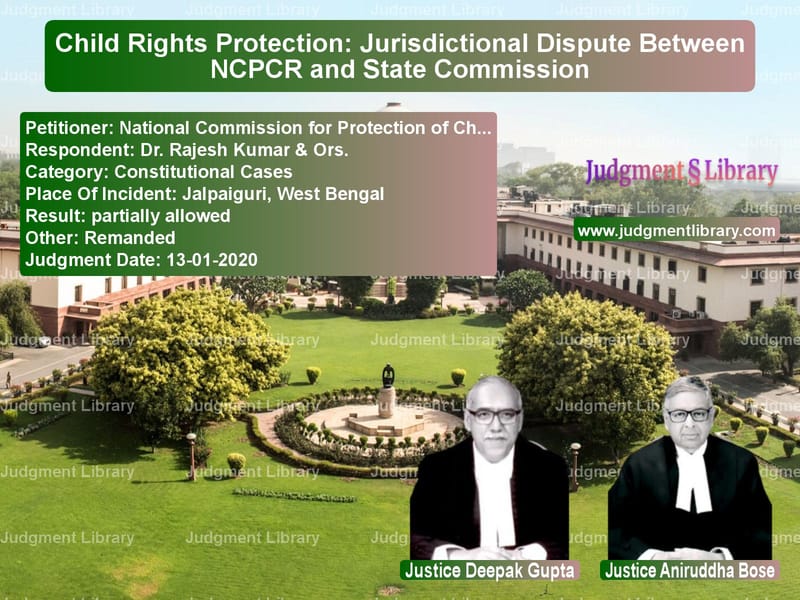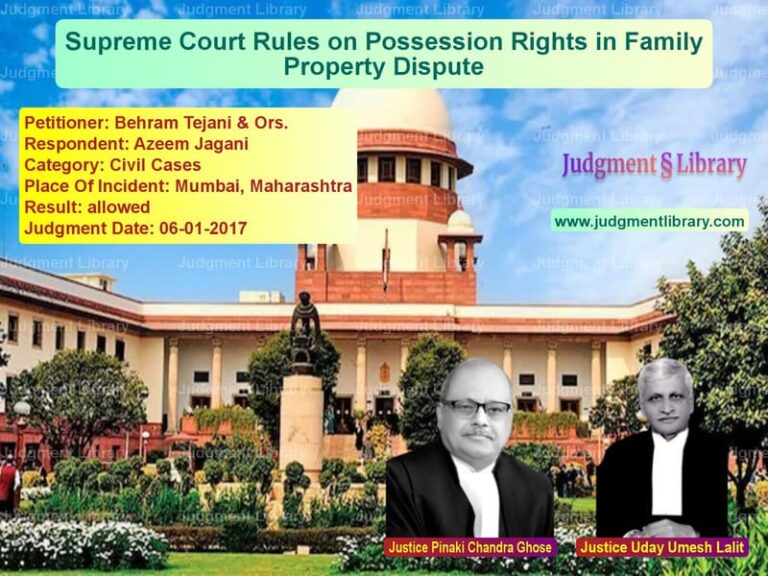Child Rights Protection: Jurisdictional Dispute Between NCPCR and State Commission
The case of the National Commission for Protection of Child Rights (NCPCR) & Ors. vs. Dr. Rajesh Kumar & Ors. sheds light on a significant issue concerning child rights protection in India. The legal battle arose due to jurisdictional conflicts between the NCPCR and the West Bengal Commission for Protection of Child Rights (WBCPCR) over an inquiry into child trafficking. The Supreme Court was tasked with determining whether NCPCR had the authority to intervene when a State Commission was already investigating the matter.
Justice Deepak Gupta expressed deep concern over the dispute, stating:
“It’s so sad! We start with a lament because institutions set up to protect children have virtually forsaken them in a fight over their so-called jurisdictions.”
Background of the Case
The controversy stemmed from reports of child trafficking in Jalpaiguri, West Bengal. In February 2017, media reports indicated that a child-care institution in the area was involved in large-scale trafficking. The NCPCR took suo motu cognizance of these reports on March 3, 2017, and sent a team for an inquiry on March 7, 2017.
The State Commission, WBCPCR, claimed that it had already taken cognizance of the matter on February 24, 2017. When the NCPCR sought information from the state authorities, they refused to cooperate, citing WBCPCR’s jurisdiction over the issue. The Additional Director General of Police (ADGP), Criminal Investigation Department (CID), West Bengal, was summoned by the NCPCR but chose to challenge the summons in the High Court. The High Court ruled in favor of the State Commission, leading the NCPCR to appeal to the Supreme Court.
Legal Arguments
Arguments by the Petitioner (NCPCR)
The NCPCR contended that it had the authority to intervene in any matter concerning child rights violations across India. The Commission argued:
“Both the NCPCR and State Commissions have been constituted for the same purpose – the protection of child rights. The State Commission had failed to take necessary action, and hence, NCPCR’s intervention was justified.”
The NCPCR further argued that the State Commission had not actively initiated an inquiry before March 7, 2017, and thus, it had the right to investigate.
Arguments by the Respondents (State Commission and ADGP)
The West Bengal State Commission countered that it had already initiated an inquiry and that the NCPCR was overstepping its jurisdiction. The counsel for the State Commission stated:
“Section 13(2) of the CPCR Act clearly states that if a matter is already being inquired into by a State Commission, the NCPCR cannot intervene.”
The ADGP, West Bengal, further contended that law and order is a state subject and that the NCPCR’s summons was beyond its jurisdiction.
Supreme Court’s Observations
The Supreme Court analyzed the roles and responsibilities of the NCPCR and State Commissions under the Commissions for Protection of Child Rights Act, 2005 (CPCR Act). The Court noted that both commissions have identical powers under Section 13 of the Act.
Justice Deepak Gupta criticized the conduct of both commissions, stating:
“This case is a classic example where, in the fight between the State Commission and the National Commission, the children have been all but forgotten. We are sorry that this Court has to spend its time resolving such disputes.”
Findings on Jurisdiction
The Court ruled that:
- The State Commission had not initiated a proper inquiry before the NCPCR’s intervention.
- The NCPCR had the authority to inquire into the matter as child trafficking has national and international ramifications.
- The NCPCR should not have used threatening language while summoning the ADGP, and officials must cooperate with statutory commissions.
Final Judgment
The Supreme Court partially allowed the appeal, ruling that the NCPCR had the right to seek information and conduct an inquiry into systemic failures leading to child trafficking. However, it clarified that criminal investigations should remain with law enforcement agencies.
The Court directed the matter to be monitored by the Juvenile Justice Committee of the Calcutta High Court to ensure systemic improvements in child protection mechanisms.
Conclusion
This judgment underscores the need for cooperation between national and state commissions in safeguarding child rights. Institutional disputes should not come at the cost of justice for vulnerable children. The ruling establishes that while State Commissions have jurisdiction over their territories, the NCPCR has the authority to step in when issues of national concern arise.
Petitioner Name: National Commission for Protection of Child Rights & Ors..Respondent Name: Dr. Rajesh Kumar & Ors..Judgment By: Justice Deepak Gupta, Justice Aniruddha Bose.Place Of Incident: Jalpaiguri, West Bengal.Judgment Date: 13-01-2020.
Don’t miss out on the full details! Download the complete judgment in PDF format below and gain valuable insights instantly!
Download Judgment: National Commission vs Dr. Rajesh Kumar & O Supreme Court of India Judgment Dated 13-01-2020.pdf
Direct Downlaod Judgment: Direct downlaod this Judgment
See all petitions in Fundamental Rights
See all petitions in Public Interest Litigation
See all petitions in Legislative Powers
See all petitions in Judgment by Deepak Gupta
See all petitions in Judgment by Aniruddha Bose
See all petitions in partially allowed
See all petitions in Remanded
See all petitions in supreme court of India judgments January 2020
See all petitions in 2020 judgments
See all posts in Constitutional Cases Category
See all allowed petitions in Constitutional Cases Category
See all Dismissed petitions in Constitutional Cases Category
See all partially allowed petitions in Constitutional Cases Category







